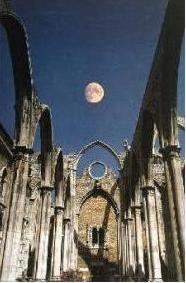

 |
 |
|
Seismology is the science of Earthquakes; their origins in the Earth's interior, propagation of seismic waves through the Earth and the occational damages caused in populated areas. |

During the great earthquake of 1755, Lisbon was greatly distroyed, including its churches. |
Throughout the history of civilization large earthquake have been widely felt and their devasting effects on cities observed. Even in ancient Egyptian chronicles we find description of damaging earthquakes. The 'explainations' about their causes have been changing with time and societies but religion has always played a major role here. Traditionally damaginging earthquakes have been considered sort of punishment of a just and almighty God but the famous Lisbon earthquake 1755 shock the foundation of Christianity as well. Most of Lisbon was destroyed including many churches and monastries but its Red Light district was only lightly damaged. If earthquakes were an act of God such behavior whas unexplainable and unacceptable as well. Thus, prominent thinkers like Rousseau denonced the coupling between science and religion. |